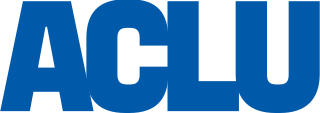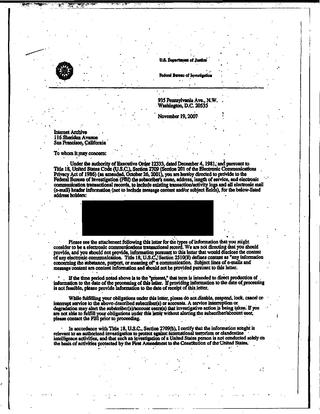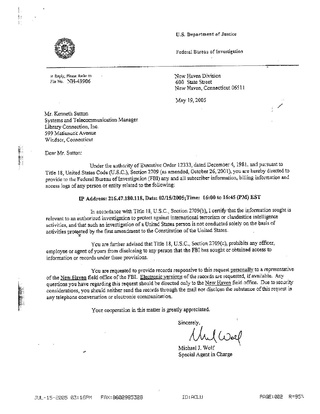Related Research Articles

The American Civil Liberties Union (ACLU) is an American nonprofit human rights organization founded in 1920. The organization strives "to defend and preserve the individual rights and liberties guaranteed to every person in this country by the Constitution and laws of the United States." The ACLU works through litigation and lobbying and has more than 1,800,000 members as of July 2018, with an annual budget over $300 million. ACLU affiliates are active in all 50 states, Washington, D.C., and Puerto Rico. The ACLU provides legal assistance in cases where it considers civil liberties at risk. Legal support from the ACLU can take the form of direct legal representation or preparation of amicus curiae briefs expressing legal arguments when another law firm is already providing representation.

The USA PATRIOT Act was a landmark Act of the United States Congress, signed into law by President George W. Bush. The formal name of the statute is the Uniting and Strengthening America by Providing Appropriate Tools Required to Intercept and Obstruct Terrorism Act of 2001, and the commonly used short name is a contrived acronym that is embedded in the name set forth in the statute.
The American Library Association (ALA) is a nonprofit organization based in the United States that promotes libraries and library education internationally. It is the oldest and largest library association in the world.
American Civil Liberties Union v. Ashcroft is a lawsuit filed on behalf of a formerly unknown Internet Service Provider (ISP) company under the pseudonym John Doe, Inc. by the American Civil Liberties Union against the U.S. federal government, by the Department of Justice under former U.S. Attorney General John Ashcroft.
Brandon Mayfield is a Muslim-American convert in Washington County, Oregon, who was wrongfully detained in connection with the 2004 Madrid train bombings on the basis of a faulty fingerprint match. On May 6, 2004, the FBI arrested Mayfield as a material witness in connection with the Madrid attacks, and held him for two weeks, before releasing him with a public apology following Spanish authorities identifying another suspect. A United States DOJ internal review later acknowledged serious errors in the FBI investigation. Ensuing lawsuits resulted in a $2 million settlement. An initial ruling declared some provisions of the USA PATRIOT Act unconstitutional, but the United States government appealed, and the ruling was overturned at the Ninth Circuit level on technical standing grounds.
The American-Arab Anti-Discrimination Committee (ADC) states that it is "the largest Arab American grassroots civil rights organization in the United States." According to its webpage it is open to people of all backgrounds, faiths and ethnicities and has a national network of chapters and members in all 50 states. It claims that three million Americans trace their roots to an Arab country.

Anthony D. Romero is an American lawyer who serves as the executive director of the American Civil Liberties Union. He assumed the position in 2001 as the first Latino and openly gay man to do so.
The USA PATRIOT Act was passed by the United States Congress in 2001 as a response to the September 11, 2001 attacks. It has ten titles, each containing numerous sections. Title II: Enhanced Surveillance Procedures granted increased powers of surveillance to various government agencies and bodies. This title has 25 sections, with one of the sections containing a sunset clause which sets an expiration date, December 31, 2005, for most of the title's provisions. This was extended twice: on December 22, 2005 the sunset clause expiration date was extended to February 3, 2006 and on February 2 of the same year it was again extended, this time to March 10.

The following are controversial invocations of the USA PATRIOT Act. The stated purpose of the Act is to "deter and punish terrorist acts in the United States and around the world, to enhance law enforcement investigatory tools, and for other purposes." One criticism of the Act is that "other purposes" often includes the detection and prosecution of non-terrorist alleged future crimes.
Title V: Removing obstacles to investigating terrorism is the fifth of ten titles which comprise the USA PATRIOT Act, an anti-terrorism bill passed in the United States after the September 11, 2001 attacks. It contains 8 sections regarding the capture and prosecution of terrorists.

A national security letter (NSL) is an administrative subpoena issued by the United States government to gather information for national security purposes. NSLs do not require prior approval from a judge. The Stored Communications Act, Fair Credit Reporting Act, and Right to Financial Privacy Act authorize the United States government to seek such information that is "relevant" to an authorized national security investigation. By law, NSLs can request only non-content information, for example, transactional records and phone numbers dialed, but never the content of telephone calls or e-mails.

The history of the USA PATRIOT Act involved many parties who opposed and supported the Patriot Act, which was proposed, enacted and signed into law 45 days after the September 11 terrorist attacks in 2001. The legislation, though approved by large majorities in the U.S. Senate and House of Representative, was controversial, and parts of the law were invalidated or modified by successful legal challenges over constitutional infringements to civil liberties. The Act had several sunset provisions, most reauthorized by the USA PATRIOT Improvement and Reauthorization Act of 2005 and the USA PATRIOT Act Additional Reauthorizing Amendments Act. Both reauthorizations incorporated amendments to the original USA PATRIOT Act, and other federal laws.

John Doe v. Alberto R. Gonzales was a case in which the American Civil Liberties Union (ACLU), Library Connection, and several then-pseudonymous librarians, challenged Section 2709 of the Patriot Act; it was consolidated on appeal with a separate case, Doe v. Ashcroft.

Jameel Jaffer is a Canadian human rights and civil liberties attorney and the inaugural director of the Knight First Amendment Institute at Columbia University, which was created to defend the freedoms of speech and the press in the digital age. The Institute engages in "strategic litigation, research, and public education." Among the Knight Institute's first lawsuits was a successful constitutional challenge to President Trump's practice of blocking critics from his Twitter account.

Nicholas Merrill is an American system administrator, computer programmer, and entrepreneur. He is the founder of Calyx Internet Access, an Internet and hosted service provider founded in 1995, and of the non-profit Calyx Institute. He was the first person to file a constitutional challenge against the National Security Letters statute in the USA PATRIOT Act and consequently the first person to have a National Security Letter gag order completely lifted.
The WikiLeaks-related Twitter court orders were United States Department of Justice 2703(d) orders accompanied by gag orders issued to Twitter in relation to ongoing investigations of WikiLeaks issued on 14 December 2010. The U.S. government sent Twitter a subpoena for information about Julian Assange and several other WikiLeaks-related persons, including Chelsea Manning. Twitter appealed against the accompanying gag order in order to be able to disclose its existence to its users, and was ultimately successful in its appeal.
Intellectual freedom encompasses the freedom to hold, receive and disseminate ideas without restriction. Viewed as an integral component of a democratic society, intellectual freedom protects an individual's right to access, explore, consider, and express ideas and information as the basis for a self-governing, well-informed citizenry. Intellectual freedom comprises the bedrock for freedoms of expression, speech, and the press and relates to freedoms of information and the right to privacy.

The USA Freedom Act is a U.S. law enacted on June 2, 2015, that restored and modified several provisions of the Patriot Act, which had expired the day before. The act imposes some new limits on the bulk collection of telecommunication metadata on U.S. citizens by American intelligence agencies, including the National Security Agency. It also restores authorization for roving wiretaps and tracking lone wolf terrorists. The title of the act is a ten-letter backronym that stands for Uniting and Strengthening America by Fulfilling Rights and Ensuring Effective Discipline Over Monitoring Act of 2015.

American Civil Liberties Union v. Clapper, 785 F.3d 787, was a lawsuit by the American Civil Liberties Union (ACLU) and its affiliate, the New York Civil Liberties Union, against the United States federal government as represented by then-Director of National Intelligence James Clapper. The ACLU challenged the legality and constitutionality of the National Security Agency's (NSA) bulk phone metadata collection program.

Litigation over global surveillance has occurred in multiple jurisdictions since the global surveillance disclosures of 2013.
References
- 1 2 Chase, Peter; Bailey, Barbara; Nocek, Jan; Christian, George (September 28, 2016). "Librarians Stand Again Against FBI Overreach". The Hartford Courant. Retrieved September 30, 2016.
- ↑ McCook, Kathleen de la Peña (2011). Introduction to Public Librarianship, pp. 63–64. Neal-Schuman.
- ↑ Connecticut Four Reunite Against FBI Overreach
- ↑ Jones, Barbara M. 2009. “Librarians Shushed No More: The USA Patriot Act, the ‘Connecticut Four,’ and Professional Ethics." Newsletter on Intellectual Freedom 58, no. 6: 195, 221–223.
- ↑ "Four Librarians Finally Break Silence in Records Case". The New York Times. May 31, 2006.
- ↑ "America's Most Dangerous Librarians".
- ↑ "Interview with Barbara Bailey". May 23, 2023.